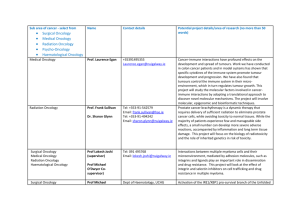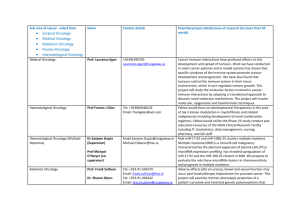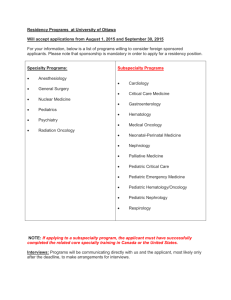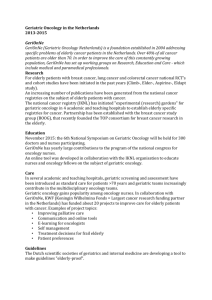Sub area of cancer
advertisement
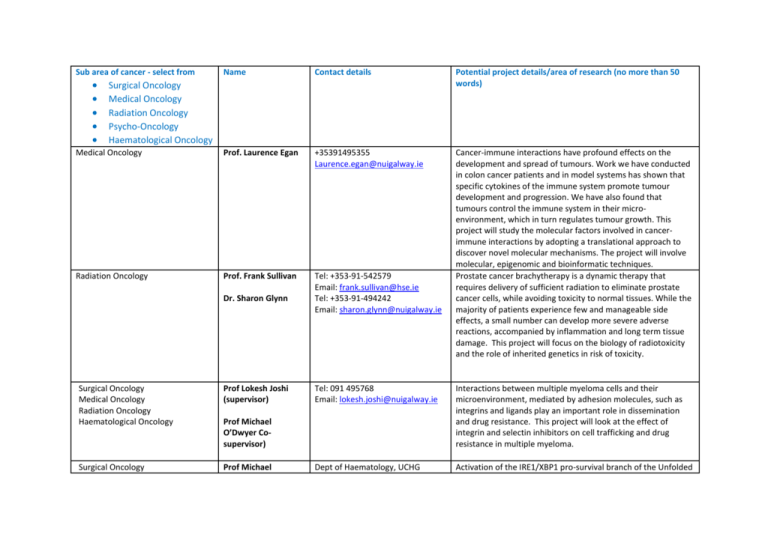
Sub area of cancer - select from Name Contact details Potential project details/area of research (no more than 50 words) Medical Oncology Prof. Laurence Egan +35391495355 Laurence.egan@nuigalway.ie Radiation Oncology Prof. Frank Sullivan Tel: +353-91-542579 Email: frank.sullivan@hse.ie Tel: +353-91-494242 Email: sharon.glynn@nuigalway.ie Cancer-immune interactions have profound effects on the development and spread of tumours. Work we have conducted in colon cancer patients and in model systems has shown that specific cytokines of the immune system promote tumour development and progression. We have also found that tumours control the immune system in their microenvironment, which in turn regulates tumour growth. This project will study the molecular factors involved in cancerimmune interactions by adopting a translational approach to discover novel molecular mechanisms. The project will involve molecular, epigenomic and bioinformatic techniques. Prostate cancer brachytherapy is a dynamic therapy that requires delivery of sufficient radiation to eliminate prostate cancer cells, while avoiding toxicity to normal tissues. While the majority of patients experience few and manageable side effects, a small number can develop more severe adverse reactions, accompanied by inflammation and long term tissue damage. This project will focus on the biology of radiotoxicity and the role of inherited genetics in risk of toxicity. Surgical Oncology Medical Oncology Radiation Oncology Psycho-Oncology Haematological Oncology Dr. Sharon Glynn Surgical Oncology Medical Oncology Radiation Oncology Haematological Oncology Prof Lokesh Joshi (supervisor) Surgical Oncology Prof Michael Tel: 091 495768 Email: lokesh.joshi@nuigalway.ie Interactions between multiple myeloma cells and their microenvironment, mediated by adhesion molecules, such as integrins and ligands play an important role in dissemination and drug resistance. This project will look at the effect of integrin and selectin inhibitors on cell trafficking and drug resistance in multiple myeloma. Dept of Haematology, UCHG Activation of the IRE1/XBP1 pro-survival branch of the Unfolded Prof Michael O’Dwyer Cosupervisor) Medical Oncology Radiation Oncology Haematological Oncology O’Dwyer (supervisor) Michael.Odwyer@hse.ie Prof Afshin Samali (co-supervisor) Medical Oncology Prof. Michael Kerin Discipline of Surgery, Clinical Sciences Institute Tel: (091) 524390 Email: michael.kerin@nuigalway.ie Medical Oncology Prof. Terry Smith (Supervisor) School of Natural Sciences Tel. 353 91 495488 Email: terry.smith@nuigalway.ie Prof. Michael Kerin (co-supervisors) Psycho-oncology Dr. AnnMarie Groarke Head, School of Psychology, NUI, Galway. Tel: 00353 91 493098 Email: annmarie.groarke@nuigalway.ie Psycho-oncology Dr. Brian McGuire Radiation/Medical Oncology Prof. Frank Sullivan Co-supervisor clinic Director, Doctoral Programme in Clinical Psychology, Co-Director, Centre for Pain Research, School of Psychology, NUI Galway 00353 91) 493266 brian.mcguire@nuigalway.ie Tel: +353-91-542579 Email: frank.sullivan@hse.ie Tel: +353-91-494242 Protein Response promotes the survival of multiple myeloma cells. Using an IRE1 ribonuclease inhibitor, MKC3946, we plan to elucidate further the role of this pathway in multiple myeloma and identify the best partner drugs to use in combination with IRE1 inhibition. MicroRNAs and Breast Cancer: MiRNAs are short RNA molecules that regulate gene expression across a range of biological processes. Recent studies from this laboratory have shown significantly altered circulating miRNA levels in breast cancer patients compared with healthy individuals. Cancer-specific miRNAs in tumour tissue and the circulation will be investigated. Correlation of molecular subtypes of breast cancer with circulating miRNAs suggests there may be specific circulating miRNA signatures of breast cancer that can be used for early diagnosis and therapeutic intervention. Our goal is to develop Point of Care molecular diagnostics assays for the detection of miRNA signatures to diagnose, subtype and support treatment of breast cancer and other types of cancer. The role of illness beliefs and coping strategies on adjustment in cancer. The efficacy of psychosocial interventions for women with breast cancer. The influence of psychological predictors on quality of life in men with prostate cancer. Other interests include risk perceptions and attitudes to cancer, posttraumatic growth and benefit finding in the cancer experience, adjustment strategies in children of mothers with cancer. Pain management and pain coping in cancer, psychological impact of cancer, effectiveness of psychological treatments in cancer, psychological factors affecting disease progression and recovery, psychological factors affecting outcome of cancer treatments. This will be a multicentre programme, in which next generation gene sequencing of prostate cancers (sequenomics) will be pursued with BH, using prospectively gathered prostate tissues Psycho-oncology Medical Oncology Dr. Bryan Hennessy Co-supervisor lab Email: bryanhennessy74@gmail.com Dr. David Finn Co-Director, Centre for Pain Research, Pharmacology and Therapeutics, School of Medicine, NUI Galway. +353 (0)91 495280 David.finn@nuigalway.ie Tel: +353 91893709 Email: emer.bourke@nuigalway.ie Dr Emer Bourke from patients undergoing prostate brachytherapy. We expect approximately 200 cases per year making this a hugely valuable predictive translational database with international significance. Pharmacological investigation of the effects of chemotherapeutic agents on pain, emotionality and learning/memory. Emphasis on the neurochemical and molecular mechanisms of action with a view to improving treatment outcomes. Triple negative breast cancers (TNBCs) are notoriously difficult to treat as they lack a receptor target and are managed with conventional chemotherapy. The current project seeks to investigate if the DNA damage response is qualitatively and quantitatively altered in TNBC compared with luminal subtypes. Genomic instability is a central event in tumourigenesis and the discovery of differential levels of genomic instability in TNBCs compared to other subtypes may uncover different underlying pathogenic mechanisms active in the intrinsic molecular subtypes of breast cancer.
